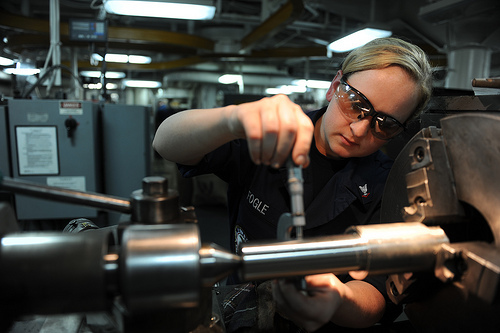Despite America’s struggling economy, companies are hard pressed to find adequately trained workers to fill jobs in manufacturing and other technical sectors as baby boomers retire.
Technical training in U.S. schools is increasingly sophisticated and appealing, in some places beginning to mimic long-established European counterparts. The well-regarded International Baccalaureate high school program has just announced a new Career Certificate (IBCC), affording students at select U.S. schools the opportunity to assume vocational skills, potentially reshaping their post-secondary goals and opportunities.
“The program can be for any student who wants to do it, but not every student who can will,” said Stephanie Childress, this year’s IBCC coordinator at Western Hills High School in Texas. “This gets the kids who still want higher-level learning but who want vocational learning versus academic.”
‘Vehicle to Motivate’ U.S. Students
The career orientation translates well into the U.S. education system, said said Drew Deutsch, IB Americas director. Eight schools across the U.S. piloted it during the 2011-2012 school year.
Multiple states are initiating or already run successful career-certification programs, and several of the pilot schools added IBCC along with other math, science, and early-college options.
“[IBCC] would help both technical educators and academic administrators to understand what intellectually demanding career technical studies might look like,” said Gene Bottoms, director of the Southern Regional Education Board, a nonprofit interstate compact that aims to improve education.
The board is currently working with 12 states, higher education, and the private sector to develop career-oriented high school classes.
“This hits the home run of what we’ve been advocating for the states,” Bottoms said. “It’s not just a work-bound curriculum, it’s a curriculum that utilizes the context of careers as a vehicle to motivate.”
Expanding Options
Technical and career options like IBCC should be available to all high school students, said Ashley Parker, a spokesman for the Association for Career and Technical Education.
“That early career exploration and preparation and really starting to develop skills…you need for long-term career success,” she said.
Career training increases students’ abilities and opportunities whether they attend a four-year college or enter the workforce directly, Childress said, because the IBCC program requires tough courses like foreign languages and higher math.
European secondary schools tend to enroll students specific tracks as early as age 14, which American schools should avoid, Parker said.
“Students should have the opportunity to pursue multiple pathways,” Parker said.
Not Just an Elective
The current IBCC pilot schools and 16 additional schools are expected to gain authorization to run the program in 2012-2013, Deutsch said, and 11 more have submitted applications for the 2013-2014 school year.
“Ninety percent of the grads from Granite Bay go on to college,” said Mike McGuire, principal of Granite Bay High School, which piloted IBCC. “This is an affluent community and most of the parents here are very well educated. It’s taken some time over a course of time to have the community look at our programs of study as something other than an elective.”
Given the changing job market, Parker said, more families will likely return to considering technical jobs desirable.
“The sectors in jobs that are really experiencing growth don’t require a four-year degree but are highly skilled jobs that do require post-secondary education,” Parker said. “We definitely think [technical education] is important for the long-term economic vitality of the United States.”
Diploma Programme v. Career Certificate
The IBCC is touted not as an alternative to the academically rigorous IB Diploma Programme, but a similarly challenging group of courses that incorporates aspects of both. Only schools that already offer the Diploma Programme are being considered for IBCC piloting and authorization.
Students take at least two IB Diploma Programme courses and the IBCC core. The core consists of a community service project, an “approaches to learning” class, language classes, and a cross-disciplinary project. They will also engage in an accredited two-year, specific career-oriented course of study aimed at preparing them for college or work upon graduation.
Career focuses include engineering, bio-medical science, automotive technology, culinary arts, business management, and construction. The pathway will be accredited through the schools that offer it.
U.S. Navy photo by Mass Communication Specialist 3rd Class Kenneth Abbate.




